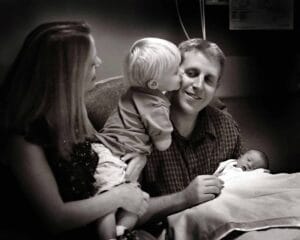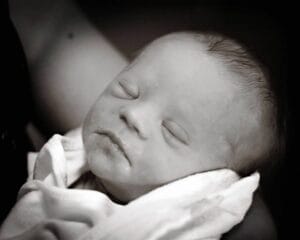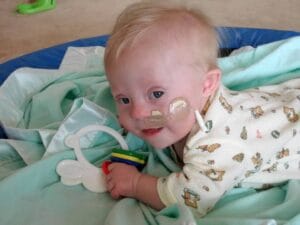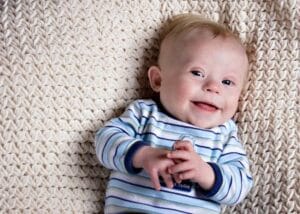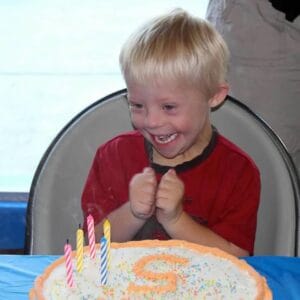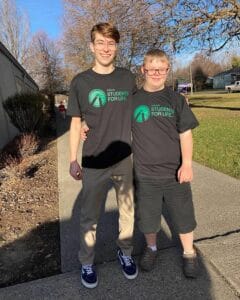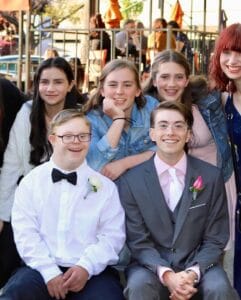This story was contributed by Amy Vawter.
(Oregon Right to Life provides a forum for pro-life people to share their personal stories. We are a non-sectarian, non-partisan, single-issue organization)
(Oregon Right to Life) – “Mommy, I wish we had ten Matthews!”
The words came from my six-year-old son, Micah, as we snuggled together on the couch. He was reading to his little brother, Matthew, who was just four years old.
“Ten?” I asked, laughing softly. “Why ten?”
“Because he’s the best brother in the whole world!” Micah replied, his voice filled with affection.
I smiled, my heart full as I thought back to the many worries we had before Matthew was born.
Would a sibling with special needs cause resentment? Would they feel burdened, neglected, or overwhelmed? We had questioned how our family dynamic would shift, but those fears had long been put to rest. They were just distant memories now—memories of a time we call the fog.
At the time, the fog had been thick and all-consuming, a dark cloud that threatened to swallow us whole. We were afraid it would never lift.
My husband was in the thick of his medical residency, while I was working part-time as a Physician Assistant. Even though our first-born, Micah, was just 18 months old, we were filled with excitement and hope as we awaited the birth of our second child. However, in an instant, our world changed. During a routine ultrasound, our doctor suspected that our baby had heart defects, and recommended we see specialists at Seattle Children’s Hospital.
Within days, we found ourselves sitting in a sterile, white room at the hospital, stunned and numb as the doctors explained the magnitude of our baby’s condition. The list of problems was long and overwhelming—far longer than we could process.
Our baby boy’s heart was severely malformed. The left side was significantly underdeveloped, too small to support life. He had a complete atrioventricular canal, which means he had large holes between both the top and bottom chambers of his heart, and the two valves in the middle of his heart were fused into one common, leaky valve. In addition, his aorta was too small to pump enough blood to sustain his body.
Even to our medically-trained minds, the diagram looked nothing like a human heart when the doctors were done marking it to show us all of the problems.
On top of this, Matthew had other complications that affected nearly every part of his body: enlarged ventricles in his brain, fluid around his kidneys, clubbed feet, too much amniotic fluid surrounding him, low growth, and bones that were smaller than they should have been. His doctors mentioned a “syndrome,” but they couldn’t pinpoint exactly which one.
As we sat in silent shock, the cardiologist carefully outlined a series of four open-heart surgeries that might extend our son’s life, but the prognosis was grim. If our baby had Down syndrome, there was no chance of survival. The doctor told us he had seen ten babies with a small (hypoplastic) left heart and Down syndrome, all of whom had passed away shortly after birth. The surgeries, if the babies survived them, only slightly extended their lives and prolonged suffering. And, these were children that did not have the canal defect or other complications that our son did.
Then came the offer we weren’t prepared for. The doctors suggested an abortion. When we refused, they pushed for an amniocentesis to confirm chromosomal abnormalities, saying the medical team would need this information in the unlikely event that our baby did make it to term. Reluctantly, we agreed. The results confirmed what we already feared: Our son had Trisomy 21—Down syndrome.
The doctor looked at us gravely. “There’s a 0% chance he’ll survive,” she said, “and if he does, he’ll only live for a few hours.” After insisting that my husband leave the room, she continued to coldly push for an abortion. “There’s no need for you to go through the rest of this pregnancy,” she pressured. “Don’t let your husband influence what you do with your body,” as if he should have no opinion about the life of his own child. I was shaken.
In the bleakness of it all, I stood firm. “No! No abortion.”
Despite my protests, the doctor continued, “I know you have moral objections to abortions, but we could schedule you for an early induction.”
“What do you mean?” I asked.
“Well, if we induce labor within the next couple weeks, the baby would be too young to survive. You know, even if he lives, he will have no quality of life.”
“That’s the same thing as an abortion,” I told her. “It is up to God, not us, to determine when and how this baby dies.”
Over the next several weeks, we mourned the loss of a child we had not yet met. We sobbed, we prayed for help, but if we were honest, we didn’t know how to hope. We began to accept that the life we had dreamed for our son might never be.
We named him Matthew—meaning “gift of God.” His middle name would be Nicholas, for St. Nicholas of Tolentino, the patron saint of dying babies. We didn’t know how long we would have with him, but we prayed that we would be able to hold him, even for just a few precious moments. Even though we felt as if we had already lost our son, we longed to have just a few moments with him before he died.
My husband said, “If all he ever knows is that he’s loved, that will be enough.” Our family and friends were all on their knees, too, and somehow this gave us some comfort in the midst of the thick fog of our grief.
Later ultrasounds showed mild improvement to Matthew’s kidneys and brain, and slight growth to the left side of his heart. This meant there was a small chance he could be a candidate for surgery after birth, but we would have to wait to find out, and the odds were still heavily stacked against him.
The doctors told us we might have a few months with Matthew, but we definitely would not see his first birthday. We took him home on hospice, prepared to offer comfort measures only. I truly felt like he was on loan from God – entrusted to my care for the short time he had on earth. I knew he wasn’t mine to keep, but somehow I felt honored to be the one to love him and care for him.
Late one September afternoon, my doctor found that Matthew’s heart rate was dropping dangerously. I was rushed to have an emergency C-section, and Matthew was born weighing slightly over four pounds, too weak to even cry. But, he was alive, and we could hold him. We sat together in the NICU, holding him close, soaking up every moment, mesmerized by his beautiful eyes. The left side of his heart was still too small to support life, and combined with his canal and aorta malformations, his little heart was simply too broken to fix.
And yet, day by day, he surprised us. Amid the oxygen tubes and feeding pumps, Matthew began to show us his personality. There was a smile, a sweet little giggle—small victories that filled our hearts with more love than we knew we could hold. Yet, my heart was breaking into a million pieces knowing our time with him was short.
How could I bear to lose this little man?
His first four months were a struggle. There were several times when I thought, “This is it! I don’t think we’re going to make it through the night.”
But somehow, Matthew pulled through.
Then, at six months old, weighing just 8 pounds, Matthew did something no one had expected: he started to grow stronger, not weaker as we had anticipated.
We took him back to see his cardiologists. Imagine our surprise to find out that the left side of his heart and his aorta had both grown to normal size! Our cardiologist was astounded. He said that the complete AV canal could be repaired in just one surgery, giving Matthew a normal life expectancy.
What a mix of emotions! Of course, we were overjoyed that Matthew was going to live. We had never even considered that possibility. However, we now faced the challenges and risks of major open-heart surgery on our tiny baby.
We were also realizing, for the first time, that we would be raising a son with Down syndrome, and we had a lot to learn.
One major risk of the surgery was damage to the biological pacemaker of the heart, located very close to where the doctors would be repairing the lower chambers. Whenever people asked us how they could help, we asked them to pray for the success of this specific part of the surgery, so Matthew would not require an artificial pacemaker afterwards.
On the day of the operation, the doctors discovered something incredible: the hole between the lower chambers of his heart was gone. One of the loose flaps from the deformed valve had adhered itself to the walls of the lower chamber, and perfectly patched the hole. The surgery only required repairing the top chambers and valves, and the doctors did not have to go anywhere near the heart’s natural pacemaker. The surgery went perfectly, and Matthew spent only five days in the hospital recovering. As soon as he was home, he was eating better than ever before and playing with more energy than he’d ever had.
As quickly as it had engulfed us, the dark fog lifted. What was once a cloud of dread and grief had been replaced with the brightness of our son, bringing warmth, hope, and joy.
I can hardly believe Matthew is seventeen now. Our little miracle has blessed us and his four siblings in ways we never could have imagined. Matthew surprises us every day. He challenges and entertains while showing us what true joy looks like. His compassion for others is far beyond his years, and he is adored by all who know him.
With Matthew, we experience a love so pure it takes your breath away.
He has taught us more about love, joy, and resilience than we could have ever imagined. His big brother, Micah, says, “Matthew brings out the very best in everyone around him.”
His sister, Mikayla, often says that she can’t imagine our life without him and his infectious laughter. “It would be so dull and boring!”
I often think of the doctor’s comment about Matthew’s “quality of life.” As his enthusiastic “Good Morning, Mommy!” warms my heart every day, or he grins while doing a cannonball into the pool, it’s easy to see that his quality of life is extraordinary! He rides a horse independently thanks to our therapeutic riding center and proudly says, “I’m good at this, Mommy!” He determinedly taught himself how to kneeboard behind our boat, never giving up until he succeeded. He loves Star Wars, knock-knock jokes, and learning about animals and geography.
At school, he has so many friends who want to talk to him that sometimes it’s hard to get him to come home! He loves the Church and wants to be a priest and a firefighter. He says Mass in his room every day and works hard on his “firefighter math and reading.”
But most of all, Matthew loves people. He builds strong connections with those he meets and genuinely cares about everyone.
Matthew has exceeded every expectation, defied every prediction. I once heard that “the devil hates Down syndrome,” and now I see why. Matthew embodies love and goodness, and he is a pure soul that the devil will never win. In a world where many children with Down syndrome are never given a chance, Matthew’s life is a testament that children with disabilities have value beyond comprehension.
I can’t possibly put into words all that he means to our family or what an incredible honor it is to raise such a precious soul – our not-so-little miracle.
Oregon Right to Life provides a forum for pro-life people to share their personal stories. To tell your story, visit ortl.org/news and upload your story using the box on the right-hand side of the page, or email your story to ashley@ortl.org.

